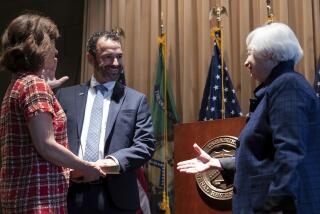SEC Head Sees Major New Fraud Cases
- Share via
WASHINGTON — David Ruder, chairman of the Securities and Exchange Commission, said Thursday that big new fraud cases may be filed this year, requiring the expansion of his agency’s staff.
“We think there is some possibility that we will be involved in what I call large-case litigation which would require very substantial resources,” he told a House Appropriations subcommittee.
Ruder did not specify whether these cases would involve insider trading, which represented some of the SEC’s hottest cases in the past year, but experts suggested that it might be a key area.
“We felt that particularly with regard to the large fraud cases which we think are going to be possibly coming to litigation during this coming year, that there will be a need for increased staff,” he said.
$25-Million Increase
The SEC is requesting $160.9 million for the coming fiscal year, beginning Oct. 1, 1988, a $25.7-million increase over the previous year’s appropriations level. The increase would allow the SEC to boost its staff by 7.5% to 2,420 positions, including 29 new positions for the regulation of securities markets.
The commission is continuing investigations stemming from the testimony of Ivan Boesky, architect of the biggest known insider-trading scandal in Wall Street’s history. As part of Boesky’s settlement, the largest involving securities fraud, he agreed to give up $100 million and cooperate with SEC investigators. Boesky began serving a three-year prison term in California Thursday on one criminal charge related to insider trading.
In February, Drexel Burnham Lambert Inc., a New York investment banker, disclosed that SEC staff planned to recommend that civil charges be brought against the company and several “key” employees. Drexel has repeatedly denied any wrongdoing and said it would not settle the case.
Ted Levine, a former SEC deputy director of enforcement, said Ruder’s comments may reflect a trend toward resisting settlements in civil cases because of the indirect consequences, including disclosure of confidential information and damage to reputations.
He said some people under investigation may decide to take a hard line and use the discovery process, when lawyers for both sides have some access to each other’s information, to find out the contents of the government case.
‘Put SEC to Test’
“When you couple that with the increased possibility of criminal prosecution, a person may make a judgment not to settle,” Levine told Reuters. “People are going to put the SEC to the test.”
Historically, 80 to 90% of enforcement cases have been settled, though this figure may be declining slightly, he said.
In his written testimony to the congressional panel, Ruder stressed that he had committed himself to aggressive law enforcement during his tenure.
“Through its enforcement program the commission will continue its vigorous pursuit of securities laws violators, including those trading on inside information,” he said.
“Cooperative agreements which have been reached with foreign governments will increase the scope of effectiveness of SEC investigations,” he added.
He expects that the number of administrative proceedings opened through this year will have more than doubled since 1980 levels, from 70 to 160.
In the same period, civil proceedings opened will have have increased 33%, from 128 to 170, and matters under inquiry will have risen 46%, from 738 to 1,074, he said.
More to Read
Inside the business of entertainment
The Wide Shot brings you news, analysis and insights on everything from streaming wars to production — and what it all means for the future.
You may occasionally receive promotional content from the Los Angeles Times.










